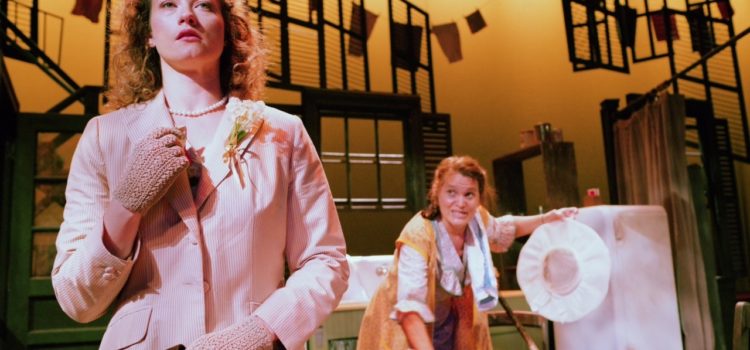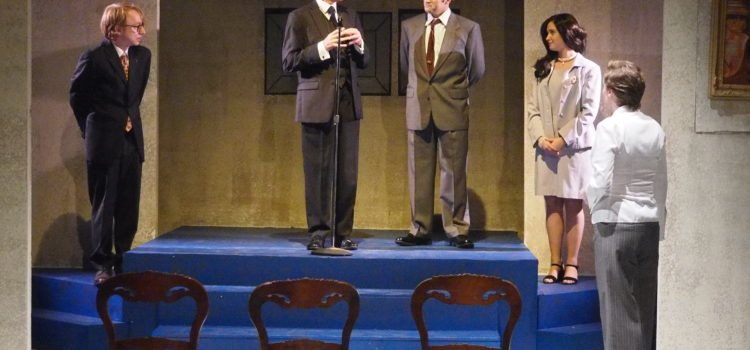By Lynn Venhaus
Managing Editor
Plays with substantial women roles were spotlighted at the seventh annual St.
Louis Theater Circle Awards March 25, with The Repertory Theatre of St. Louis’
musical production of “Evita” and a homegrown “A Streetcar Named Desire” from
the third annual Tennessee Williams Festival each receiving seven awards.
Both iconic female-lead shows had received the most
nominations, 11 apiece, when the Circle announced them in January. The awards
recognized outstanding work locally produced by regional professional companies
during the calendar year 2018.
Nominees Kari Ely and Michelle Hand in “Into the Breeches!”The comedy “Into the Breeches!”, the first play in Shakespeare
Festival St. Louis’ new program, “In the Works,” won four awards. The world
premiere was in January 2018, with its first St. Louis performances in
September. The comedy from Chicago playwright George Brant is about a
fictitious theater group in 1942, and with the men away at war, the director’s
wife sets out to produce an all-female version of “Henry V.” It had roles for
six women and two men. In addition to awards for ensemble, director Nancy Bell
and best production, Michelle Hand won best actress.
The Circle, which includes veteran area theater critics, annually recognizes outstanding work in comedies, dramas and musicals, and with two opera categories.
Each of the 33 categories featured five nominees, with 23 local companies cited for 54 shows, and 120 artists receiving nods, including 10 with two apiece.
This year, there were three ties: sound design in a play, costume design in a musical and musical ensemble.
Evita won seven awards from the Circle“Evita,” the vibrant Tony Award-winning Andrew Lloyd Webber-Tim Rice musical, earned awards for musical direction (Charlie Alterman), choreography (Gustavo Zajac and Mariana Parma), set design (Luke Canterella), lighting (John Lasiter), director (Rob Ruggiero, his third), ensemble and production of a musical.
The landmark “A Streetcar Named Desire,” written in 1947 by the great American playwright Tennessee Williams, who spent his formative years in St. Louis, earned honors for Sophia Brown as Outstanding Actress – for her heart-wrenching portrayal of the emotionally needy and mental fragile faded beauty Blanche Dubois, sound design (original music by Henry Palkes and sound by Amanda Werre), lighting design (Sean M. Savoie), set design (James Wolk), direction (Tim Ocel), ensemble and production of a drama.
The 18 other awards went to separate shows, with both The
Black Rep and The Muny winning three apiece, and The Rep adding two more for earning
the most, nine.
Jeff Cummings and Katy Keating in “Life Sucks.” Photo by ProPhotoSTLIn comedy, Katy Keating won for Supporting Actress as feisty but unrequited lovesick Sonia in New Jewish Theatre’s “Life Sucks,” a ‘sort of’ adaptation of Chekhov’s “Uncle Vanya” by Aaron Posner. She was also part of the award-winning ensemble of “Into the Breeches!”.
Isaiah Di Lorenzo in “Rosencrantz and Guildenstern Are Dead.” Photo by Ron James.Isaiah Di Lorenzo won Supporting Actor as The Player, the leader of the Tragedians, in St. Louis Shakespeare’s production of Tom Stoppard’s “Rosencrantz and Guildenstern Are Dead.” He also was in the award-winning ensemble of “A Streetcar Named Desire.”
Will Bonfiglio as Mary Dale in “Red Scare on Sunset.” Photo by Justin Been. Will Bonfiglio won his second Outstanding Actor Award, as film star Mary Dale in Stray Dog Theatre’s “Red Scare on Sunset.” He was honored in 2017 for the one-man show, “Buyer & Cellar,” also at Stray Dog.
For costume designs, Lou Bird won for The Rep’s “Born Yesterday” vintage wardrobe in the play category and there was a tie in the musical category between Leon Dobkowski, who won for The Muny’s colorful “The Wiz,” and Darryl Harris for the elegant “Crowns: A Gospel Musical” at The Black Rep.
There was another tie in sound design in a play – besides “Streetcar,” Rusty Wandall won for Lucas Hnath’s contemporary “The Humans” at The Rep.
Laurie McConnell, left, as Birdie Hubbard in “The Little Foxes.” Photo by Patrick HuberIn drama, Laurie McConnell won Supporting Actress as forlorn
Birdie Hubbard in St. Louis Actors’ Studio’s production of Lillian Hellman’s “The
Little Foxes.” She won in 2017 for Supporting Actress in a Musical, for her portrayal
of Joanne in “Company” at Insight Theatre Company.
Eric Dean White as Satan and Chris Ware as Judas. Photo by Ann AuerbachEric Dean White, a previous nominee, won Supporting Actor for playing the slick, smooth, haughty and conniving Satan in “The Last Days of Judas Iscariot” at Mustard Seed Theatre.
Ron Himes in “Fences”
Another previous nominee and winner, Ron Himes won Outstanding Actor as bitter garbage collector Troy in August Wilson’s “Fences at The Black Rep last winter. In 2014, The Black Rep won best ensemble and production for “The Whipping Man.”
The Black Rep’s “Torn Asunder” best new playThe Black Rep also won Best New Play for Nikkole Salter’s “Torn
Asunder,” which dramatized true stories of newly emancipated African Americans
trying to overcome the vestiges of slavery so they could reconnect with their
families.
Joy Boland won Outstanding Supporting Actress in a Musical for her portrayal of the imposing villainess sea witch in Variety Theater’s “Disney’s The Little Mermaid.”
Beth Leavel as Mama Rose in “Gypsy.” Photo by Philip Hamer.For their powerhouse musical performances, Corbin Bleu won Outstanding Actor as the fleet-footed matinee idol Don Lockwood in “Singin’ in the Rain” and Beth Leavel was honored as the controlling stage parent Mama Rose in “Gypsy,” both at The Muny.
Corbin Bleu in “Singin’ in the Rain” at The Muny. Photo by Phil Hamer.Leavel had been nominated three times before (“Hello Dolly!” “Oklahoma!” and “Thoroughly Modern Millie,” all at the Muny. She is currently performing on Broadway in a St. Louis-produced original musical, “The Prom.”
Stephanie Merritt and Kent Coffel in “The Light in the Piazza” Kent Coffel won Outstanding Supporting Actor in a Musical for his performance as well-meaning haberdasher Signor Naccarelli, Fabrizio’s father, in “The Light in the Piazza,” presented by R-S Theatrics in its St. Louis regional premiere.
Anything Goes at New Line Theatre. Photo by Jill Ritter LindbergTying with “Evita” for musical ensemble was New Line Theatre’s vivacious “Anything Goes.”
It was a three-peat for Ruggiero, who won for directing “Evita,” and had previously been honored for The Rep’s productions of “Follies” and “Sunday in the Park with George.”
“Regina” at OTSL was Outstanding Opera ProductionIn the opera categories, Opera Theatre of St. Louis was honored
for both Outstanding Achievement in Opera, which was given to director Patricia
Racette for “La Traviata,” and the Mark Blitzstein adaptation of “The Little Foxes”
— “Regina,” as Outstanding Production of an Opera.
Three special awards were bestowed: To the
Muny for a century of performances celebrated during its centennial season of
2018; to Kathleen Sitzer, founder and long-time artistic director of the New
Jewish Theatre, for lifetime achievement; and to Steven Woolf, Augustin
artistic director of The Rep for more than 30 years, also for lifetime
achievement.
Sitzer retired after New Jewish Theatre’s 2017-18 season, while Woolf will retire after The Rep’s 2018-19 season this spring. Organized in 2012, the St. Louis Theater Circle includes founding members Steve Allen of stagedoorstl.com, Mark Bretz of the Ladue News, Robert A. Cohn of the St. Louis Jewish Light, Chris Gibson of Broadway World, Gerry Kowarsky of HEC-TV’s “Two on the Aisle,” Chuck Lavazzi of KDHX, Judith Newmark, now of judyacttwo.com, Ann Pollack of stlouiseats.typepad.com, Lynn Venhaus, now of St. Louis Limelight magazine, Bob Wilcox of HEC-TV’s Two on the Aisle, and Calvin Wilson of the St. Louis Post-Dispatch, Tina Farmer of KDHX and Michelle Kenyon of snoopstheatrethoughts.com. Eleanor Mullin is the administrator.
Those who helped produce the show at the Loretto-Hilton Center on the campus of Webster University included Andrea Torrence and Peggy Holly, who put together the slide show; awards assistance Hannah Daines, stage manager Alycia Martin and assistant stage manager Delaney Dunster, voice-over announcer Colin Nichols and box office assistants Kimberly Sansone and Harry Ginsburg.
Renowned local musician Joe Dreyer was the accompanist and Deborah Sharn performed an opening number.
Special thanks to Volunteer Lawyers and Accountants for the Arts, Price Waterhouse Cooper LLC, who tabulate the Circle ballots, and to the awards certificate calligrapher Susan Zenner.
Contact the Circle by email: stltheatercircle@sbcglobal.net and like us on Facebook.
Evita at The RepInto the Breeches! at Shakespeare Festival St. Louis
“La Traviata” at Opera Theatre of St. Louis

Lynn (Zipfel) Venhaus has had a continuous byline in St. Louis metro region publications since 1978. She writes features and news for Belleville News-Democrat and contributes to St. Louis magazine and other publications.
She is a Rotten Tomatoes-approved film critic, currently reviews films for Webster-Kirkwood Times and KTRS Radio, covers entertainment for PopLifeSTL.com and co-hosts podcast PopLifeSTL.com…Presents.
She is a member of Critics Choice Association, where she serves on the women’s and marketing committees; Alliance of Women Film Journalists; and on the board of the St. Louis Film Critics Association. She is a founding and board member of the St. Louis Theater Circle.
She is retired from teaching journalism/media as an adjunct college instructor.


